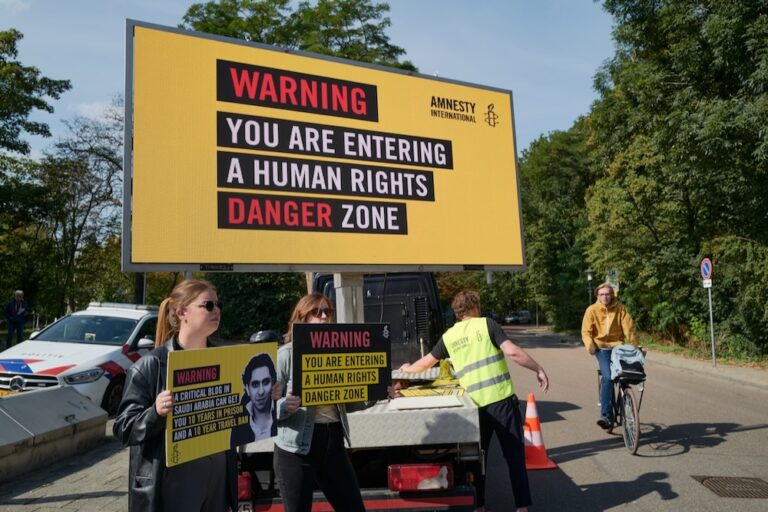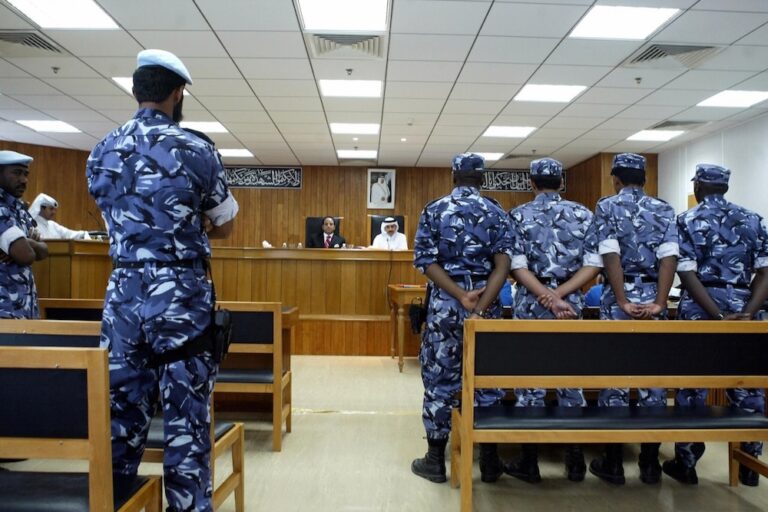Mikhlif al-Shammari was arrested in connection with articles he wrote and published on several websites that criticised statements by clerics attacking Shia Muslims.
(Human Rights Watch/IFEX) – New York, June 16, 2010 – King Abdullah of Saudi Arabia should instruct officers of the Criminal Investigation Department in Khobar to immediately release a human rights activist who apparently was detained arbitrarily, Human Rights Watch said today. The accusations against the activist, Shaikh Mikhlif bin Dahham al-Shammari, following his arrest on June 15, 2010, appear to violate his right to free expression, Human Rights Watch said.
Arresting officers told al-Shammari they were acting on the orders of Prince Muhammad bin Fahd bin Abd al-‘Aziz, the governor of the Eastern Province, in response to articles al-Shammari had written and published recently on several websites, blocked in Saudi Arabia, that criticized statements of clerics attacking Shia Muslims.
“Arresting Mikhlif al-Shammari simply for opinions he expressed peacefully shows the limited reach of King Abdullah’s commitment so far, five years into his reign, to protect human rights,” said Sarah Leah Whitson, Middle East director at Human Rights Watch.
Earlier, on May 15, Khobar police arrested al-Shammari over the articles he had written criticizing anti-Shia religious views. Al-Shammari told Human Rights Watch at the time that he refused to answer questions put to him by the police since King Abdullah had ordered that cases regarding publications fall within the jurisdiction of the Ministry of Information and Culture, not the police and regular courts. The police released him after six hours based on a personal bail guarantee, but the police changed the description of his case from one concerning his articles to one of “creating public attention against corruption,” al-Shammari told Human Rights Watch.
He was arrested again on the evening of June 15, while he was dining at the home of an acquaintance in Jubail, 80 kilometers north of his home in Khobar. Officers of the Criminal Investigation Department took him to the Khobar police station, where they placed him in a holding cell overnight with 10 other persons. Al-Shammari was able to communicate briefly with his family and Human Rights Watch. On June 16, he began a hunger strike to protest his arbitrary detention. His arrest was the result of the earlier investigation into his articles, al-Shammari told Human Rights Watch, but he has not been charged or brought before a prosecutor.
In one of the articles in question, al-Shammari responded to remarks of Muhammad al-‘Arifi, a controversial government-salaried imam of the Buradi mosque in Riyadh. During a sermon on January 1, al-‘Arifi had described Ayatollah Ali al-Sistani, whom many Saudi and other Shia Muslims consider their highest religious authority, as an “obscene, irreligious atheist.” Al-Shammari asked how Sunnis would feel if a Shia had called al-‘Arifi an “obscene, irreligious, atheist Wahhabi in Najd.” Al-Shammari added that he would not approve of such expression and would defend al-‘Arifi against such remarks.
Najd is a province in the heartland of Saudi Arabia and home to a significant number of members of Saudi Arabia’s Sunni religious establishment. It was there that in 1744/1745 itinerant scholar Muhammad bin Abd al-Wahhab and the local ruler, Muhammad al-Sa’ud, forged a pact that would allow Abd al-Wahhab to spread his Islamic teachings while supporting the military conquests and rule of the Al Sa’ud. The pact between the ruling Sa’ud family and the religious establishment that follows “Wahhabi” interpretations of Islam, endures to this day.
Al-Shammari is the representative for the Eastern Province of his al-Shammar tribe, who are Sunni Muslims from the area around Ha’il, in northwestern Saudi Arabia. He has gained prominence as a human rights activist in Saudi Arabia over the past several years. He has worked on improving relations between Sunnis and the local Shia population, including by writing articles against disparagement of Shias by Sunni extremists. However, Saudi authorities, who systematically discriminate against the Shia minority, have tried to undercut such efforts. After al-Shammari visited a prominent Saudi Shia cleric, Shaikh Hasan al-Saffar, on February 4, 2007, Saudi secret police arrested al-Shammari and detained him for three months without charge.
Since December 2009, al-Shammari has published 18 articles on public interest and human rights issues, including Sunni-Shia relations, on http://www.saudiyoon.com , most of which also appear on http://www.rasid.com
Al-Shammari told Human Rights Watch that the officers who arrested him on the night of June 15 did not present an arrest warrant and that he was not officially charged. However, Khobar police officials told him that they were acting on orders of Prince Muhammad, the provincial governor.


